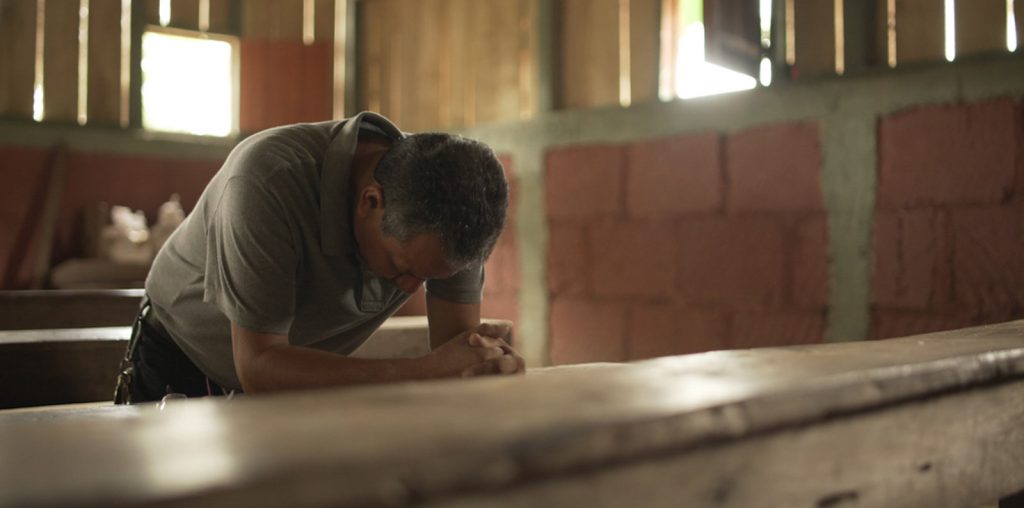
Diamonds might be a girl’s best friend, but friendship is barely alive aboard the diamond mining trawler called The Spirit of Namibia. In the new documentary “Diamonds and Rust,” this rusting vessel is moored off the coast of southwestern Africa with the purpose of vacuuming up diamonds from the ocean floor for processing and sale by the De Beers conglomerate. However, the real gems here are the 38 members of the endlessly obstreperous crew, a hopelessly ill-matched group whose undisguised tempers and flaring idiocy are so pungent that they make the passengers on the S.S. Poseidon seem mild-mannered and convivial in comparison. For anyone who gets a secret kick out of dysfunctional behavior multiplied to the nth degree, “Diamonds and Rust” is one of the year’s must-see films.
In “Diamonds and Rust,” the main problems are literally drawn out in black-and-white. The management of De Beers, who are on board supervising the ship’s operations (without actually seeming to do very much work) are entirely white South Africans. These blokes seem to have forgotten that the apartheid days are gone: in their most benign they reel off puerile racist humor (“How many darkies does it take to screw in a light bulb?”), but at their worst they babble bitterly about how blacks are a “different species” and how the cramped living quarters on the Spirit of Namibia is a step-up from an African lifestyle where the locals (if this is to be believed) sleep in the dirt and eat roadkill.
The crew of the vessel are entirely black Namibians, who are powerless to complain against their current employment standards yet nonetheless express rue and misery on how they are still being treated like South African colonials (one Namibian wears his disgust on a t-shirt sporting the SWAPO logo of the Namibian independence movement). The crew are treated to amazing indignities; at several points, the white power pricelings from De Beer sit like spoiled brats in the ship’s mess waiting for the black crew to serve their meals. At no point in the film do blacks and whites share a meal.
Caught in the middle are a group of Cubans who are nominally in charge of the ship’s day-to-day functions, including a captain who is supposedly running the vessel (you could never tell it from here) and a wacky chef who prepares Cuban delicacies which nobody enjoys (at one point, an angry man confronts the camera to state he would rather make his own sandwiches than trust the chef). And hovering about the periphery of this floating madhouse is an Isræli security manager who achieves the impossible by making everyone on the ship hate him with passionate intensity thanks to a thoroughly obnoxious personality and a peerless gift for tactless arrogance.
Filmmakers Adi Barash and Ruthie Shatz were aboard the Spirit of Namibia for 90 days and captured an endless skein of calamities, insults and insanities; it would seem every day is a bad hair day on this weird ship. When a Namibian deckhand brought up on unsubstantiated bad behavior complains about a double standard for dealing with whites and blacks, the all-white shipboard tribunal accuses him (with a straight face) of being a racist! The Isræli security manager spends endless time yelling at the Namibian janitorial staff not to shake their wet mops inside a cabin with electronic equipment…even though the janitors were clearly not shaking their mops but instead were carefully wringing them over a bucket. A South African manager spends endless days on the ship’s shortwave radio trying to arrange passage back to the mainland so he can receive relief for a dental problem, only to have the unctuous voice at the other end of the radio wave blandly inform him that passage cannot be arranged since no replacement was available to fill his shipboard void.
The initial purpose for the mission (collecting diamonds from the ocean floor) is stalled when the ship’s pumps get mucked up and hopelessly clogged, requiring constant but futile maintenance. The ship’s plumbing also goes AWOL, forcing the men to clean themselves with empty coffee cans full of boiled water. The Cuban chef, who seems to be in his own world, lays out endless rows of meat while exclaiming the regality of his cuisine…while flies tiptoe casually across the beefy settings.
Unlike so-called reality television programs where the so-called stars are obviously playing for the cameras, the Spirit of Namibia crew are alternately amused and annoyed by the presence of a film crew. The hotheads, of course, are the real treat here as they go full steam on camera while making angry fools of themselves. The funniest moment comes towards the end of the voyage, when the filmmakers barge into the cabin of the Isræli security manager to ask why he is so rude to everyone. The Isræli stares into the camera with an intensity which would prove homicidal if looks could kill and then brusquely asks the filmmakers to close the door on their way out of his cabin. This excellent slice of bad behavior wonderfully caps this engrossing and brilliantly insightful production.
